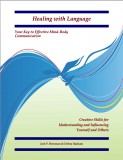Evidence is required to show competence or success or that something has been achieved. For example, if the goal is to weigh less, weighing becomes part of the process as it provides evidence of progress and lets you know you are moving in your desired direction. The number on the scale is a visual evidence procedure.
Your competence in your practice or area of expertise also requires evidence procedures. If you want your patients or clients to recognize you as an authority in integrative medicine, for example, certain things are required to convince others that you are truly integrating models of care and therapeutic modalities in a way that is beneficial for them.
Although certificates on your wall may be necessary for you to say publically what you are, most people need more than that to be convinced, and different individuals have different preferences for how they receive that evidence. Some will need to see your work, to have visual evidence. Others will need to hear good things about you, auditory evidence. Still others will believe your competence only when the relationship with you produces a desired feeling, such as safe, OK, confident, or respected, a kinesthetic evidence procedure.
- I know Dr. Smith is good because I have seen the results of her work.
- I know Dr. Smith is good because many people have told me about her work.
- I know Dr. Smith is good because she works with such confidence and treats me with respect.
For some of your clients or patients, demonstration is enough. Others may need reminders. If you are married (or have been married) you know that saying “I love you” once won’t last a lifetime. Your significant other may need a reminder of the evidence from time to time (and you need to know how often). The same is true for your clients or patients. Although you won’t be able to tell for sure which evidence procedure will be most important to a specific client, your intake interview and conversations with your clients will help you identify what’s important to each of them. Then, you can use their evidence procedure to build and maintain rapport throughout the treatment process.
Send your questions about how other-than-conscious communication skills can hurt or help your patients and clients to Joel P. Bowman (Joel@SCS-Matters.com) or Debra Basham (Debra@SCS-Matters.com), co-developers of Subtle Communication Systems. We will provide answers to those for you. For more information about Neurolinguistic Programming (NLP), Hypnosis or Hypnotherapy, or about the Imagine Healing Process, visit:http://ImagineHealing.info or http://SurgicalSupport.info.
 Healing with Language: Your Key to Effective Mind-Body Communication is available for a limited time for $10 plus $5 shipping within the U.S. For volume orders and overseas shipping, check with Debra. See the Table of Contents and List of Exercises in PDF format for more information about this comprehensive text and training manual.
Healing with Language: Your Key to Effective Mind-Body Communication is available for a limited time for $10 plus $5 shipping within the U.S. For volume orders and overseas shipping, check with Debra. See the Table of Contents and List of Exercises in PDF format for more information about this comprehensive text and training manual.
